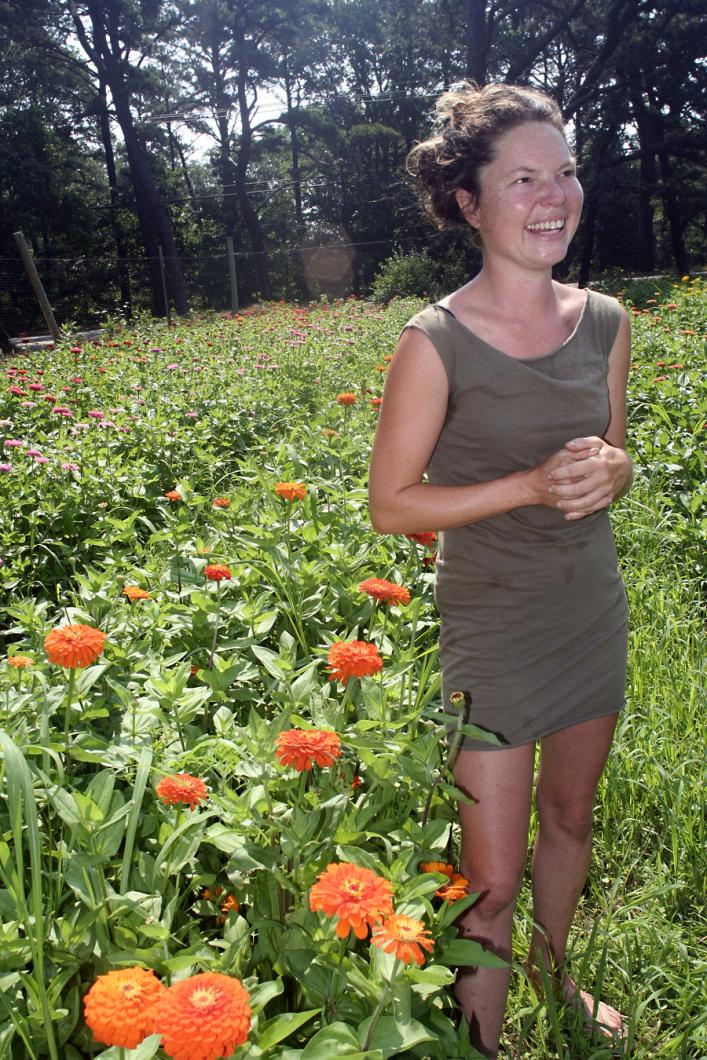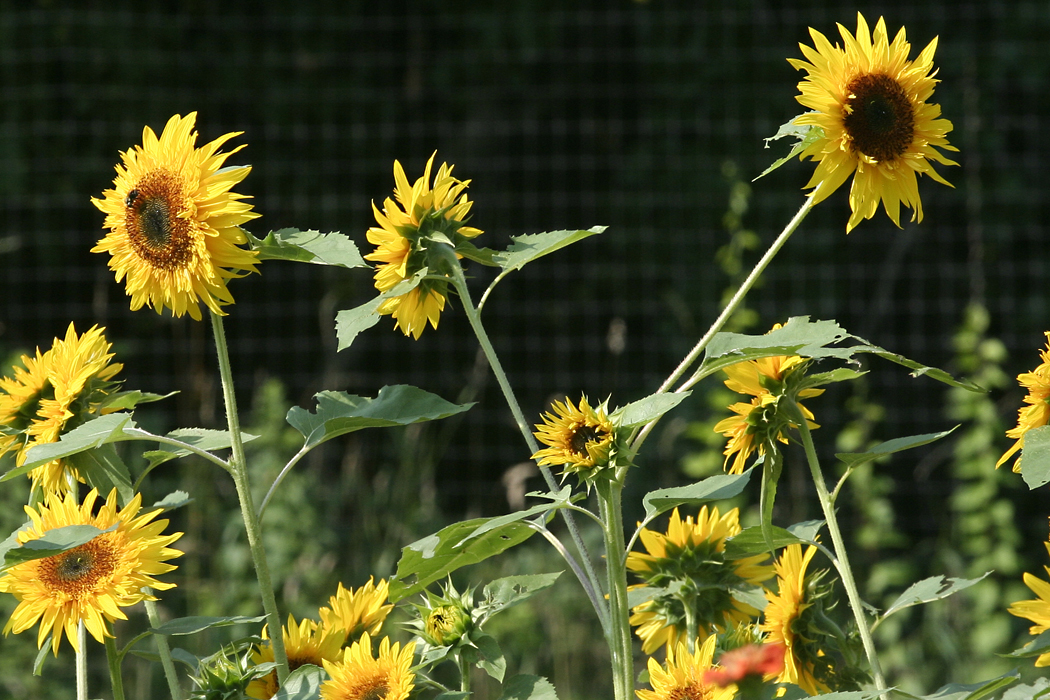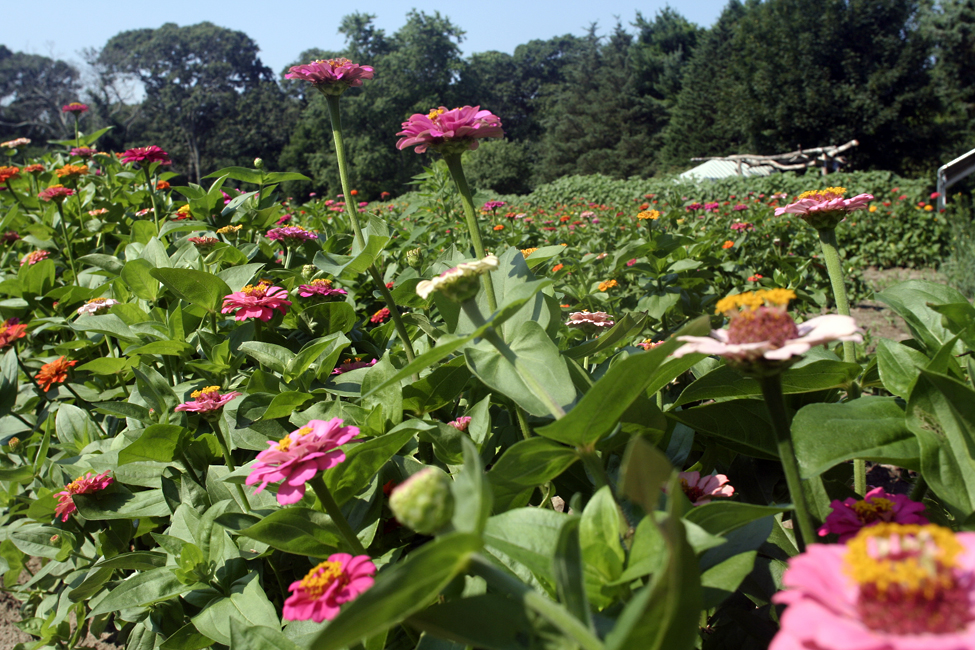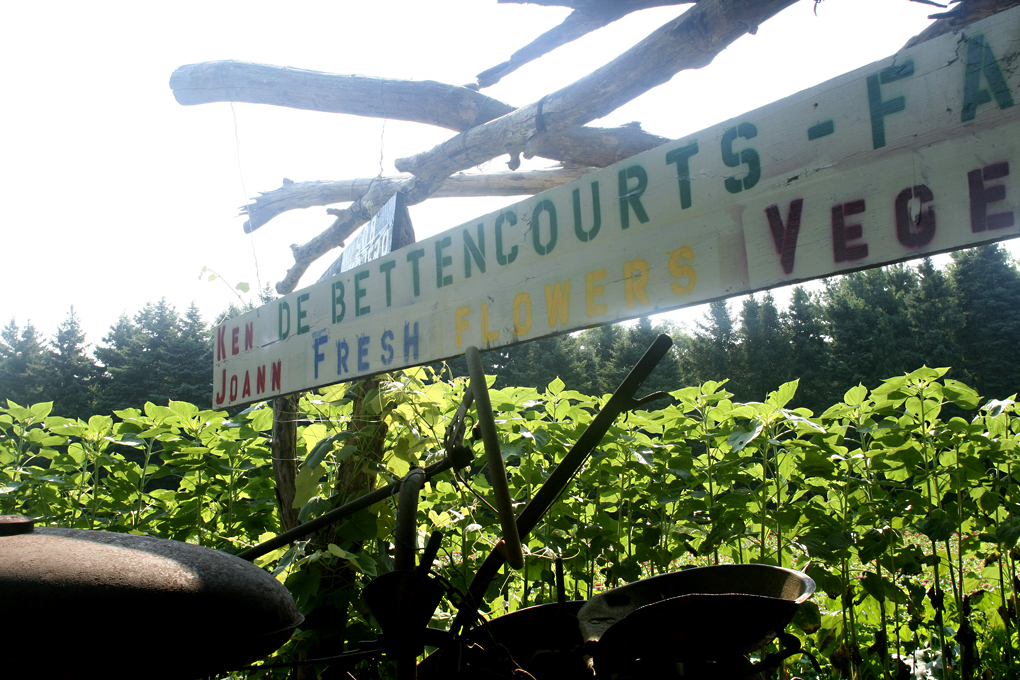Food is for your stomach, and flowers are for your soul. That’s what Victoria Riger tells people when they ask why she sells flowers rather than produce. Ms. Riger, Krishana Collins, and Ken DeBettencourt are all farmers. You won’t see their names among the big farm names on the Island, but their bouquets of flowers fill our homes with color and scents that no potato can do. They are a few of the flower growers on the Vineyard.
“I usually cut my flowers Friday night, sometimes late in the dark,” Ms. Riger said in an interview with the Gazette earlier this week. “It had to do with having kids, but it’s the time when I really enjoy them in their beauty and nature. I do it because of the joy.”
Ms. Riger has been selling her flowers at the West Tisbury Farmers’ Market since 1996, and has strictly stuck to her favorite palette of blue and white flowers. “I needed a niche at the market, and I had been working antiques, especially with white and blue porcelain,” Ms. Riger said of her inspiration. “I grew blue and white flowers because other people [at the market] had had a very dark palette.”
But even with a cap on flower growers at the market this year, Ms. Riger enjoys seeing returning customers year after year. “When people have more time to shop, they’re into flowers there’s great conversation, and they ask for tips,” she said. “The market is so cool because you walk down the alleys with all these colors and it’s refreshing after a long winter.”
When she’s not spending her time in her garden at her West Tisbury home, Ms. Riger teaches kindergarten at the West Tisbury School. “Being in the field is a nice complement to kindergarten kids,” Ms. Riger said.
Ms. Riger tends to grow perennials because of her year-round job, but experiments with annuals every now and then. Peonies, flox, crocosmia, sundrops, Chinese bellflower and many varieties of hydrangea fill Ms. Riger’s garden in the spring, summer, and even into October, when wedding season is in full swing on the Island.
“Things are blooming at totally different times this year because of the heat, so you are getting new combinations this year,” she said. Last year was the busiest wedding season yet, but Ms. Riger doesn’t do it alone. She teams up with fellow grower and neighbor at the market, Krishana Collins of West Tisbury.
“I grew perennials and she grew annuals, and even though our styles are totally different, we both appreciate each other’s,” Ms. Riger said.
“Some brides just come and I pick buckets of flowers and they arrange them themselves,” Ms. Collins said on a recent visit to her farm. “And that’s the most economic way of doing it. It’s hard because when you do a wedding it’s so much work and it’s a lot of creativity and responsibility.”
Ms. Collins and Ms. Riger offer this as an affordable option for weddings, but they create bouquets and arrangements as well. “I also love doing weddings because it’s a time you get to be creative in an unusual way, you get to be a little bit more frivolous than you usually are and get to decorate things that don’t usually get decorated,” she added.
When you drive up to Ms. Collins’ farm on Old County Road, the smell of her buckets of lilies displayed at her small stand is overwhelming. She held up a nymph lily to my nose, careful not to disrupt the beads of pollen. “It’s like no other lily, it smells like vanilla,” she said. It was a welcome surprise.
Lilies are just one type of flower Ms. Collins grows; she has cosmos, zinnias, sunflowers, dahlias and some salad greens as well. That day was the first morning she has slept in since March, working at least 10 hours a day in the field with her flowers, sometimes up to 16.
“Our eyes aren’t used to these colors,” Ms. Collins said in her field of 20,000 zinnias. “And when you’re picking these bright colors all day long, by the end of the day you’re delirious. We’re just giggling and can’t mutter a complete phrase.”
Ms. Collins plants her varieties by color, with a row of red, a row of yellow, and so on. When she goes to the market, her buckets are organized by color, making her made-to-order bouquets a little easier to handle.
“It’s really nice because you interact with people and you get to know them and it’s nice when people come to the stand and you’re not staring at them,” Ms. Collins said, smiling. “You’re busy. Watching people create a bouquet is really nice, and it’s really fun, but it’s pretty intense.”
Ms. Collins has a crew of four including herself at the market and helping her in her three-and-a-half-acre fields. She leases her property in West Tisbury from Andrew Woodruff of Whippoorwill Farm, who continues to grow tomatoes in the back greenhouses. Her newest addition to her land is leasing property from the land bank in Chilmark.
“Every year I have different theme,” Ms. Collins said. “One year was blue flowers, the next year I started doing lilies and breathtaking dahlias, and the next year I wanted to see how much I could produce. This year I wanted to see how far I could go.”
“It’s my experimental year to see if it’s worth it to undertake so much,” she added. “It’s a lot to take care of; it’s a gamble.”
Ms. Collins has been gambling on the land for the past five years but always knew she wanted to be a farmer. She attended Antioch College, where she studied in a co-op program that allowed her to work on an organic farm. She was hooked.
“I have the best food and the best flowers, so my life is really rich in what I’m surrounded by,” she said of her decision to stop paying for college loans and become a full-time farmer. “I’m focused on growing and making bouquets, and I feel very, very fortunate.”
Every year presents new challenges (often including weeds and critters), but this year posed a new problem. “I plan successive plantings, so I planned for August to have the most because that’s when the most people are here,” Ms. Collins explained. “But everything is coming in two weeks early [because of the sun and heat] so I have to push to move everything; you’re exhausted by the time you’ve planted and picked and then have to figure out distribution. It’s an extra push.”
Ken DeBettencourt has experienced the same problem this summer. His field of zinnias, cosmos and sunflowers is in full bloom this week, and while they usually last throughout the summer, he only expects another few weeks of harvesting.
Mr. DeBettencourt has been planting his seeds around Mother’s Day every year for the past 40 years, he said, standing under the shade of his stand on Wing Road in Oak Bluffs. He had nearly 20 large bouquets of zinnias, and that day he had only sold four or five.
“I used to have regulars, a lot of them used to get off the boat and come here and then go home. Things are changing,” he said. “People are just not buying like they used to.” This summer may mark the last summer of the Island staple, one factor being poor business.
At the stand, someone drove up to ask how much the flowers were. He joked with the woman in the passenger seat, asking if she wanted two bunches, pretending not to hear her. He then told her the price, and she promised to return shortly with money. When she pulled away I asked if she would be back. “Definitely not,” he said.
“I enjoy doing it, but it’s getting too much,” he said of the land he’s trying to sell. “It’s fun but it’s more of a hobby.” Mr. DeBettencourt gets up at 5 a.m. and is constantly involved in the fields, whether through planting, weeding, watering or rototilling. He relies on some of his antique tractors that still “purr like kittens” to help in the fields as well as some help from his wife, Joanne; otherwise he’s a one-man show.
Mr. DeBettencourt used to sell at the West Tisbury market and to Eden Market in Vineyard Haven, but now is only selling at his stand in Oak Bluffs. “They’re the biggest bunches on the Island,” Mr. DeBettencourt said smiling. “Always have been.”
While Mr. DeBettencourt may be hurting from the poor economy, Ms. Collins said competition helps the community of farmers strive to be better. “We all have an understanding amongst each other that we’re working really hard, and it’s also important to respect boundaries,” she said. “The last thing that we as farmers want to do is cut another farmer out we’re trying to preserve agriculture, so it’s a different consideration. We help each other out.”
This column is meant to reflect all aspects of agriculture and farm life on the Vineyard. Remy Tumin may be contacted at 508-627-4311, extension 116, or e-mail her at rtumin@mvgazette.com







Comments
Comment policy »